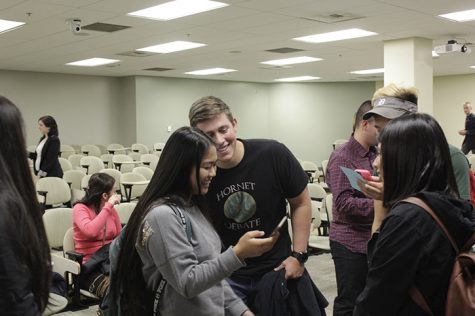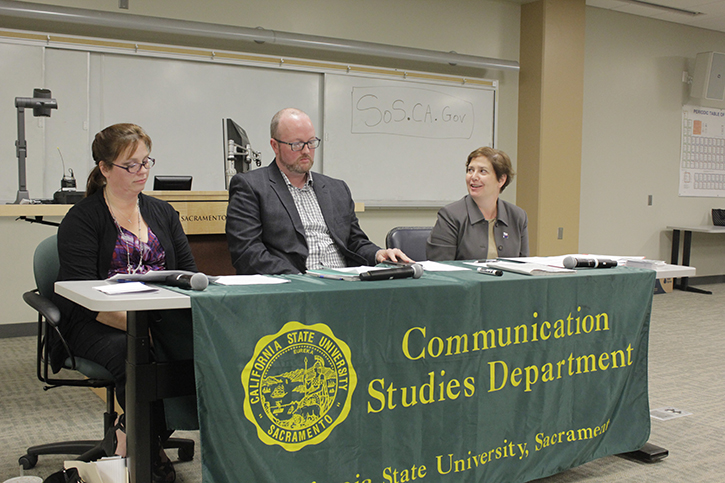More than 100 students gathered in Del Norte Hall Thursday night to hear a panel discussion organized by Sacramento State’s Hornet Debate Team intended to demystify the voter registration process and show students how to educate themselves on ballot measures.
Jared Anderson, coach of the Hornet Debate Team, has been organizing campus forums like Thursday’s every semester since he came to Sac State four years ago.
“I wanted to make sure that we are active on campus and sharing debate with the student body,” Anderson said. “With the election coming up in 27 days, I really wanted to do something about voter education.”
Anderson said that the main person responsible for organizing Thursday’s forum was Kiersten Brockman, a graduate student in communication studies who has acted as director of public forums this semester.
Brockman also said that historically what drives students to their forums is the promise of extra credit from their professors. This year, instead of signing in, some TA’s told their students to take a selfie with Adam Austin, assistant debate team coach, to prove their attendance at the event.

The panelists took turns answering questions from Brockman on topics including the logistics of registering to vote, how the electoral college works and how they thought voter turnout could be increased.
On the subject of voter turnout, Moon told students to be brave, and that they shouldn’t feel pressured to vote on every single ballot measure.
“This is not a test,” Moon said. “If you don’t feel like you know enough about it, don’t vote on it. … They’re not going to throw (your vote) out because each and every race and each and every measure is missing something.”
In Sacramento, Ditty said, the voter registration rate is 11 percent for people aged 18-25.
Although voter turnout is always higher every four years during presidential elections, Schwab said the most important elections to participate in are local ones.
“They’re not voting for the offices that affect them the most,” Schwab said. “Those are the ones that are going to determine the quality of your life on a day-to-day basis.”
All three panelists encouraged the students present to educate themselves before the Nov. 8 election, and to make sure to register to vote by 11:59 p.m. on Oct. 24.
The panelists said students can go to California Secretary of State Alex Padilla’s website or votersedge.org for more information on ballot measures and voter registration.
“You are not alone in this world,” Moon said. “If it doesn’t affect you directly, it affects someone very close to you. That’s how voting impacts you.”
























































































































Viviem • Nov 30, 2017 at 10:14 pm
I think that this decision is very useful one for the educational community. You really have to know the things you are voting for. This will become a great step for the young towards their independence and social awareness. If we look at the issue of the vote I think this approach should be applied to the other situations as well. For example, if the students took the vote about a good writing service, the StudArea.com would definitely have the learning place.
Melany • Mar 26, 2017 at 5:11 am
Thanks for the post!
otto • Oct 15, 2016 at 2:15 pm
California has enacted the National Popular Vote bill.
By 2020, the National Popular Vote bill could guarantee the presidency to the candidate who receives the most popular votes in the country, by changing state winner-take-all laws (not mentioned in the U.S. Constitution, but later enacted by 48 states), without changing anything in the Constitution, using the built-in method that the Constitution provides for states to make changes.
Every vote, everywhere, for every candidate, would be politically relevant and equal in every presidential election.
No more distorting and divisive red and blue state maps of predictable outcomes.
No more handful of ‘battleground’ states (where the two major political parties happen to have similar levels of support among voters) where voters and policies are more important than those of the voters in 38+ predictable states, like California, that have just been ‘spectators’ and ignored after the conventions.
The bill would take effect when enacted by states with a majority of the electoral votes—270 of 538.
All of the presidential electors from the enacting states will be supporters of the presidential candidate receiving the most popular votes in all 50 states (and DC)—thereby guaranteeing that candidate with an Electoral College majority.
The bill was approved this year by a unanimous bipartisan House committee vote in both Georgia (16 electoral votes) and Missouri (10).
The bill has passed 34 state legislative chambers in 23 rural, small, medium, large, red, blue, and purple states with 261 electoral votes.
The bill has been enacted by 11 small, medium, and large jurisdictions with 165 electoral votes – 61% of the 270 necessary to go into effect.
NationalPopularVote